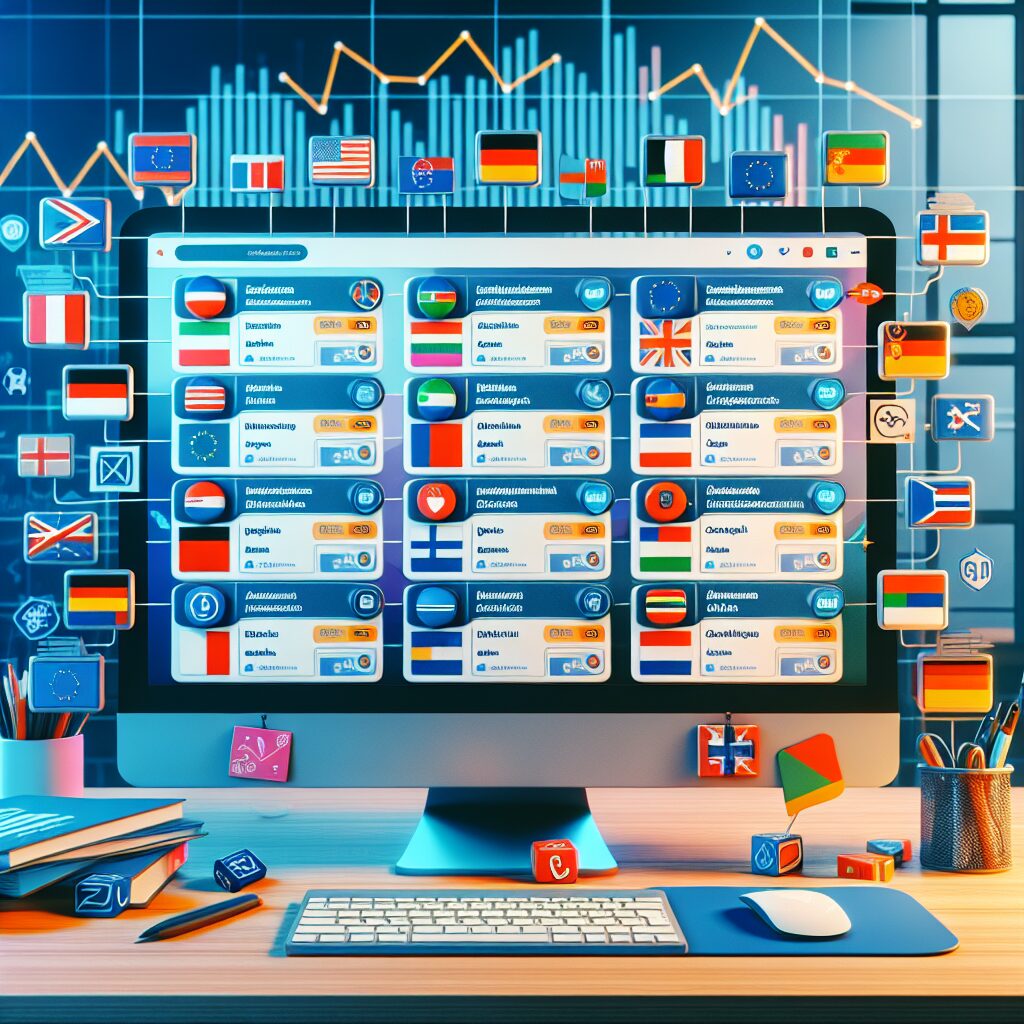About eldris
At Eldris, we automate SEO, multilingual site expansion, and EU compliance for brands scaling across Europe. Our AI-powered platform handles everything from content publishing to regulatory docs—so you don’t have to.
In This Article
- Start with a clear multilingual SEO strategy aligned with local search habits.
- Leverage Eldris’s AI for translation, localisation, and automation at scale.
- Ensure hreflang accuracy and technical SEO compliance with minimal manual effort.
- Track multilingual KPIs to identify what content resonates in regional markets.
- Use Eldris to outperform competitors relying on basic translation tools.
- Future-proof your global SEO with AI-driven adaptability and expansion readiness.
Introduction to Multilingual SEO
Why Multilingual Matters in Global Markets
In a rapidly globalising digital landscape, multilingual SEO is no longer a luxury—it is a necessity for enterprises seeking international growth. Multilingual SEO refers to the process of optimising web content across multiple languages to increase visibility in international search engines like Google, Baidu, or Yandex. By ensuring your content is discoverable by users in their native language, brands can dramatically increase engagement, loyalty, and conversions.
When deployed effectively, multilingual SEO helps companies rank in local search results, boost user trust, and outmanoeuvre competitors who may overlook language-specific content strategies. This is particularly vital for businesses expanding into new markets or operating with decentralised content hubs. With search engines rewarding localisation, the question is no longer whether you should invest in multilingual SEO, but how to do it the right way. That’s where tools like Eldris enter the equation.

What Is Eldris and How It Works
AI Capabilities That Power Optimization
Eldris is an advanced AI-powered platform specifically designed to streamline multilingual SEO across geographies. At its core, Eldris leverages natural language processing (NLP), machine translation, and content intelligence to optimise websites in multiple languages without compromising on search visibility or editorial quality.
Unlike conventional static translation tools, Eldris analyses intent, semantic associations, and keyword relevancy at both the page and domain levels. This allows brands to adapt content not only linguistically, but contextually for different cultures and customer expectations. Eldris’s AI continuously calibrates content by analysing engagement metrics, click-through rates, and ranking position, all of which fuel its self-learning algorithm.
Moreover, Eldris supports integrations with CMS platforms, facilitating automated content delivery across language variants. From managing sitemaps to assigning hreflang values, Eldris reduces the manual overhead while improving accuracy through its proprietary AI engines.
Setting Up a Multilingual Strategy with Eldris
Translation, Localization, and Automation
Building a multilingual SEO strategy requires more than just translating landing pages. Eldris employs a layered approach that begins with machine translation and is immediately followed by context-adaptive localisation. This ensures that idiomatic nuances, cultural cues, and brand tone are preserved across markets.
Eldris automates workload-heavy tasks including keyword research in multiple languages, local search intent analysis, and competitor benchmarking. The platform suggests optimised headlines, metadata, and body copy tailored to each geo-linguistic region.
Furthermore, Eldris enables businesses to establish repeatable, scalable workflows by generating translation memories and localisation glossaries. These resources ensure future content iterations maintain consistency without rework. Equipped with automation rules, Eldris can auto-publish optimised content across subfolders, domains, or country-specific site sections.
By removing the inefficiencies typically associated with global SEO campaigns, Eldris empowers teams to focus on strategy instead of execution. Its suite of automation features becomes indispensable in fast-paced content environments.
Managing hreflang Tags and Technical SEO
Hreflang Implementation Best Practices
Hreflang attributes signal to search engines which version of a webpage should be shown to users based on their language and geographical preferences. Without correct implementation, search engines may rank the wrong content or suppress visibility entirely—negating the benefits of multilingual SEO efforts.
Eldris automates the generation and management of hreflang tags with remarkable precision. As it maps out your site architecture, the tool assigns language-region codes (e.g., en-GB, es-ES) to the appropriate pages, preventing duplicate content issues and geo-targeting errors.
Moreover, the tool scans for missing or incorrect hreflang configurations and sends alerts, ensuring ongoing compliance. Eldris also provides integration support with Google Search Console and Bing Webmaster Tools for validation and monitoring of the hreflang directives. This proactive management guarantees that your multilingual content remains technically sound while scaling globally.
Scalability for Multisite SEO Efforts
Centralised Content and Scalable Deployment
Global enterprises often struggle with fragmented web properties across different regions. Coordinating SEO across various TLDs or subdirectories becomes chaotic without a centralised strategy. Eldris addresses this complexity by offering a unified dashboard capable of handling multisite management and version control for every language model.
Through content cloning and versioning, Eldris allows brands to launch language variants simultaneously while preserving local SEO metadata. Enterprise stakeholders can view progress, assign roles, and initiate updates directly within the platform. This eliminates the need for tedious back-and-forth between regional marketing teams.
In cases where AI-driven automation is insufficient, the system integrates human input workflows for nuanced localisation or compliance checks. With auto-sync features linked to your CMS or DAM, scalability is not a challenge—it becomes a competitive advantage.
Tracking KPIs for Multilingual Performance
Analytics, Engagement, and Ranking Metrics
No multilingual SEO campaign is complete without a robust performance tracking suite. Eldris aggregates data from third-party analytics tools to offer real-time multilingual KPI dashboards. Marketers can monitor organic traffic, dwell time, bounce rate, and conversion rates—all segmented by language and region.
Using machine learning, Eldris predicts content performance and suggests top-performing elements that should be replicated or modified in other language versions. This learning loop allows continual optimisation based on tangible outcomes rather than assumptions.
Additionally, Eldris integrates SERP heatmaps and visibility scoring per language group to highlight keyword gaps or declining content. This ensures that your SEO efforts stay aligned with changing customer behaviour and competitor movements in diverse linguascapes.
Case Study: Eldris in Action Globally
Real Brands, Real Results in Multilingual Markets
A global e-commerce brand adopted Eldris to scale their multilingual SEO across EMEA and APAC regions. Prior to using Eldris, the company lacked consistency in tone, and faced frequent SEO issues due to incorrect hreflang usage and incomplete keyword mapping.
With Eldris, they launched 14 new language versions within 90 days, doubling their organic traffic from Germany, Japan, and Brazil. The AI-enabled optimiser refined CTAs for cultural relevance and local purchasing behaviours, increasing conversion rates by 22%.
Post-implementation, the brand’s CX team reported significant reductions in localisation turnaround times and saw 35% fewer instance-based SEO tickets. Eldris transformed their go-to-market efficiency, becoming their standard SEO localiser for all future campaigns.
Comparing Eldris to Other Localization Tools
Why Automation With Eldris Gives an Edge
Unlike conventional CMS add-ons or plugin-based localisers, Eldris is purpose-built for multilingual SEO precision. While platforms like WPML or Weglot focus on simple translations, they often lack the algorithmic depth to optimise keywords, intent, and metadata dynamically.
Eldris sets itself apart through its AI-first architecture, central control hub, and continuous learning capabilities. It not only translates and localises text but also analyses semantic and behavioural performance post-publication—an edge seldom found in competing systems.
Moreover, Eldris integrates with enterprise tech stacks, offering better data flow and time-to-publish efficiency. This positions Eldris as the more strategic solution for global-first brands seeking sustainable multilingual SEO impact.
Top Challenges and How Eldris Solves Them
Common Issues in Global SEO
Challenges in multilingual campaigns typically include inconsistent translation quality, SEO misalignment, duplicated content, and time-intensive manual updates. Eldris solves these by automating critical pain points and applying AI-based checks to prevent errors before they go live.
For example, Eldris utilises intelligent clustering to avoid keyword cannibalisation between language variants. It also performs QA on structure, layout drift, and even mobile responsiveness when deploying across languages that differ in script length and formatting.
Whether managing five or fifty languages, Eldris ensures all content remains coherent, high-performing, and search engine compliant—freeing up SEO professionals to work on strategy rather than triage.
Future of Multilingual SEO and AI Automation
What’s Next for Global Content Teams?
As artificial intelligence becomes increasingly refined, the future of multilingual SEO leans heavily on automation, predictive modelling, and personalisation at scale. Eldris exemplifies this shift by integrating machine-led insights with human creativity.
We can expect multilingual content to move beyond static text—innovations like voice search and conversational AI will demand extended localisation across immersive digital surfaces. Eldris is already experimenting with voice-led translations, intent mapping, and automated schema generation to remain ahead of the curve.
Global content teams will benefit from tools that are not just multilingual SEO engines but strategic partners capable of adapting in real time. Eldris embodies this evolution, continuously pushing boundaries of what localisation can achieve through AI.
“Eldris didn’t just shorten our localisation pipeline—it redefined how we approach multilingual SEO across 40 countries.”
Conclusion & Takeaways
Adopting Eldris for multilingual SEO means embracing a new paradigm of content optimisation—one driven by AI intelligence, automation, and scalability. Whether you’re a marketing leader or SEO strategist, this platform equips you to compete effectively in an interconnected world where language is both a barrier and a bridge. From seamless hreflang management to real-time analytics and advanced localisation, Eldris is tailored for outcomes, not just operations.
Great guide on the-complete-guide-to-eldris-for-multilingual-content-optimization-interactive – Community Feedback
Is multilingual good for SEO?
Yes, multilingual SEO allows businesses to reach a global audience, improve international rankings, and boost overall site traffic.
How do you optimize content for multiple languages?
Use translation tools like Eldris, ensure technical SEO best practices for hreflang tags, and localize content for each target market.
What is the difference between international and multilingual SEO?
International SEO targets users by location, while multilingual SEO specifically adapts content for different languages to improve user experience and rankings.








